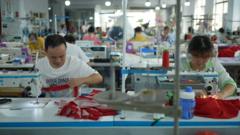Amid the economic strain from these elevating tariffs, Chinese officials are rallying for a unified stand against what they term “trade tyranny” while dealing with internal economic obstacles and potential shifts in supply chains.
China Urges Global Unity Against Trump's Trade Policies

China Urges Global Unity Against Trump's Trade Policies
China has called for international collaboration to combat the impact of rising U.S. tariffs introduced by Trump, which have reached an unprecedented 104%, affecting key sectors and driving uncertainty in trade.
China has openly expressed its resistance against President Trump’s tariffs, which have posed significant challenges to its exporters, prompting calls for solidarity among nations to uphold free trade principles.
China's appeal for global alliances comes as the country grapples with the damaging effects of heightened tariffs imposed by Trump, who has escalated the situation to a historic 104%. Major exporters, including the fast-fashion leader Shein, are feeling the pressure severely as these tariffs squeeze profit margins. In a bold editorial, the state-run China Daily called for worldwide unity to counteract this "trade tyranny," emphasizing collaborative efforts with countries like Japan and South Korea.
Foreign ministry spokesperson Lin Jian emphasized that China staunchly opposes such hegemonic practices, warning that tariffs above 35% could obliterate profits for numerous Chinese businesses that rely heavily on exports. Amidst a sluggish domestic economy and weakening consumption, China's government faces a pressing dilemma as exports have been pivotal for growth.
Many businesses have reported that the tariffs have dramatically impacted their operations, with logistics firms and manufacturers struggling to navigate the increasingly complicated supply chains. A Chinese company that manages cross-border logistics lamented that the additional costs from tariffs mean “everyone earns less.”
While official retaliatory actions have not yet been implemented, speculation surrounds potential sanctions, including a possible ban on Hollywood films and the suspension of cooperation on fentanyl with the U.S., according to reports from Chinese media.
Firms like Fuling, which supplies disposable tableware to major U.S. fast-food chains, are making adjustments—such as establishing new production facilities in Indonesia—to cope with declining revenues driven by U.S. tariffs. However, as new tariffs on Indonesian goods are now also in effect, the future remains uncertain for these exporters.
Experts warn that the ramifications of Trump’s tariffs extend beyond the immediate impacts—potentially igniting global economic downturns. As Trump continues to apply higher tariffs to various nations, and with little dialogue between Beijing and Washington following the president's return to the White House, the pressures on Chinese exports are mounting. The American Chamber of Commerce has voiced concerns, stating that the current level of upheaval is unprecedented and raises questions about overall benefits to consumers and the economy.
As analysts predict that the tariffs will force China to lean more towards domestic consumption, the ongoing trade war faces an unclear resolution path. Trade experts speculate that without adjustments, businesses will struggle significantly, with some firms reporting a complete halt in operations due to trade decoupling.
China remains hopeful for negotiation, yet the reality on the ground suggests a challenging road ahead where trade will be fundamentally altered under the weight of punitive tariffs and global economic shifts.
China's appeal for global alliances comes as the country grapples with the damaging effects of heightened tariffs imposed by Trump, who has escalated the situation to a historic 104%. Major exporters, including the fast-fashion leader Shein, are feeling the pressure severely as these tariffs squeeze profit margins. In a bold editorial, the state-run China Daily called for worldwide unity to counteract this "trade tyranny," emphasizing collaborative efforts with countries like Japan and South Korea.
Foreign ministry spokesperson Lin Jian emphasized that China staunchly opposes such hegemonic practices, warning that tariffs above 35% could obliterate profits for numerous Chinese businesses that rely heavily on exports. Amidst a sluggish domestic economy and weakening consumption, China's government faces a pressing dilemma as exports have been pivotal for growth.
Many businesses have reported that the tariffs have dramatically impacted their operations, with logistics firms and manufacturers struggling to navigate the increasingly complicated supply chains. A Chinese company that manages cross-border logistics lamented that the additional costs from tariffs mean “everyone earns less.”
While official retaliatory actions have not yet been implemented, speculation surrounds potential sanctions, including a possible ban on Hollywood films and the suspension of cooperation on fentanyl with the U.S., according to reports from Chinese media.
Firms like Fuling, which supplies disposable tableware to major U.S. fast-food chains, are making adjustments—such as establishing new production facilities in Indonesia—to cope with declining revenues driven by U.S. tariffs. However, as new tariffs on Indonesian goods are now also in effect, the future remains uncertain for these exporters.
Experts warn that the ramifications of Trump’s tariffs extend beyond the immediate impacts—potentially igniting global economic downturns. As Trump continues to apply higher tariffs to various nations, and with little dialogue between Beijing and Washington following the president's return to the White House, the pressures on Chinese exports are mounting. The American Chamber of Commerce has voiced concerns, stating that the current level of upheaval is unprecedented and raises questions about overall benefits to consumers and the economy.
As analysts predict that the tariffs will force China to lean more towards domestic consumption, the ongoing trade war faces an unclear resolution path. Trade experts speculate that without adjustments, businesses will struggle significantly, with some firms reporting a complete halt in operations due to trade decoupling.
China remains hopeful for negotiation, yet the reality on the ground suggests a challenging road ahead where trade will be fundamentally altered under the weight of punitive tariffs and global economic shifts.





















